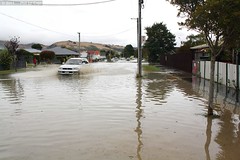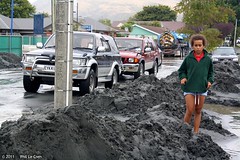
Search
Images for earthquake 2011; more images...
Photograph by Jocelyn Kinghorn 518
Images, UC QuakeStudies
The Harley Building, on the corner of Worcester Boulevard and Cambridge Terrace. On the windows are some spray painted codes left by USAR after it had been checked following the February earthquake.
The Superloo Portaloo
Images, UC QuakeStudies
A digitally manipulated image of a portaloo. The photographer comments, "It seems that it was a bit of a lottery if your portaloo was ever cleaned and emptied after the Christchurch earthquakes".
Photograph number UC 11-0372-39
Images, UC QuakeStudies
Silver Award Hamish Drake (second from the left) and Andrew Chalmers (middle). Pictured here with Vice-Chancellor Dr Rod Carr, Prime Minister John Key and Minister for Canterbury Earthquake Recovery Gerry Brownlee.
Photograph number UC 11-0372-36
Images, UC QuakeStudies
Silver Award recipients, Dean Manson (originally from Ashburton but studied in Christchurch). Pictured here with Vice-Chancellor Dr Rod Carr, Prime Minister John Key and Minister for Canterbury Earthquake Recovery Gerry Brownlee.
Photograph by Jocelyn Kinghorn 279
Images, UC QuakeStudies
Spray painted codes outside a block of apartments after it had been cleared by a USAR team. This system was used following the February earthquake to mark buildings that have been checked.
Photograph by Jocelyn Kinghorn 357
Images, UC QuakeStudies
A concrete-block fence has been spray painted after the building was cleared by a USAR team. This system was used following the February earthquake to mark buildings that have been checked.
Photograph by Jocelyn Kinghorn 355
Images, UC QuakeStudies
A concrete-block fence has been spray painted after the building was cleared by a USAR team. This system was used following the February earthquake to mark buildings that have been checked.
Photograph by Jocelyn Kinghorn 356
Images, UC QuakeStudies
A concrete-block fence has been spray painted after the building was cleared by a USAR team. This system was used following the February earthquake to mark buildings that have been checked.
Photograph by Jocelyn Kinghorn 353
Images, UC QuakeStudies
A concrete-block fence has been spray painted after the building was cleared by a USAR team. This system was used following the February earthquake to mark buildings that have been checked.
Photograph by Jocelyn Kinghorn 354
Images, UC QuakeStudies
A concrete-block fence has been spray painted after the building was cleared by a USAR team. This system was used following the February earthquake to mark buildings that have been checked.
Umut Akguzel Photograph 478
Images, UC QuakeStudies
A photograph of earthquake-damaged buildings on Tuam Street. Buildings have been cordoned off with wire fencing and the entrance to Poplar Lane is barricaded with barbed wire and wooden frames.
Umut Akguzel Photograph 094
Images, UC QuakeStudies
A photograph of an earthquake-damaged building on the corner of Welles and Manchester Streets. Masonry from the top floor of the building has come away and windows have been broken.
Day in the life of Canterbury Chamber of Commerce head
Audio, Radio New Zealand
The head of the the Canterbury Employers' Chamber of Commerce, Peter Townsend, says the effects of the Christchurch earthquake will dominate business in Canterbury for at least the next three years.
Fewer receiving Christchurch Employer Support Subsidy
Audio, Radio New Zealand
Unemployment figures released yesterday may have showed little change in the nation's jobless rate, but it appears there's a gaping hole in the statistics when it comes to earthquake struck Christchurch.
Expert says developers should be required to submit soil rpts
Audio, Radio New Zealand
A geotechnical expert from the United States has told the Royal Commission into the Canterbury Earthquakes, developers should be required to submit soil reports before building on land prone to liquefaction.
Ballantynes celebrate reopening of Christchurch store
Audio, Radio New Zealand
Two weeks after re-opening, the landmark Christchurch department store, Ballantynes has thanked staff, contractors and customers for their hard work and loyalty since the February earthquake forced it to close.
Quake references a no-no in this year's NCEA exams
Audio, Radio New Zealand
Earthquakes disrupted schooling in Canterbury this year, but the region's teenagers can rest assured they will not be rattled by unexpected references to quakes in this year's NCEA and Scholarship exams.
WEMO ERT Team Set 1 - June 2011 - Photograph 1
Images, UC QuakeStudies
A photograph of Celia Wade-Brown, Mayor of Wellington, speaking at a graduation ceremony for more than 40 new civil defence volunteers in the Wellington Town Hall. Members of the Wellington Emergency Management Office team were presented certificates of appreciation during this event. The certificates were presented to the members to honour their involvement in the emergency response to the 22 February 2011 earthquakes in Christchurch.
Photograph by Neil Macbeth 264
Images, UC QuakeStudies
Groups of emergency personnel conferring at the base of the collapsed Canterbury Television building on Madras Street in the aftermath of the 22 February 2011 earthquake. Behind them, other emergency personnel can be seen searching the ruins for trapped people. Smoke can be seen billowing from the remains of the building.
Photograph by Neil Macbeth 182
Images, UC QuakeStudies
A team of Fire Service and Search and Rescue personnel using a crane to check the Forsyth Barr building for people trapped by the 22 February 2011 earthquake. A sign reading, "Help" has been stuck to one of the windows and a window above has already been broken by the team.
People in Disasters Conference - Education Renewal: A sector response to t…
Videos, UC QuakeStudies
A video of a presentation by Garry Williams during the fourth plenary of the 2016 People in Disasters Conference. Williams is the Programme Manager of the Ministry of Education's Greater Christchurch Education Renewal Programme. The presentation is titled, "Education Renewal: A section response to the February 2011 Christchurch earthquake".The abstract for this presentation reads as follows: The Canterbury earthquakes caused a disaster recovery situation unparalleled in New Zealand's history. In addition to widespread damage to residential dwellings and destruction of Christchurch's central business district, the earthquakes damaged more than 200 schools from Hurunui in the north, to the Mackenzie District in the east, and Timaru in the south. The impact on education provision was substantial, with the majority of early childhood centres, schools and tertiary providers experiencing damage or subsequent, with the majority of early childhood centres, schools and tertiary providers experiencing damage or subsequent operational issues caused by the ensuing migration of people. Following the February earthquake, over 12,000 students had left the school they had been attending and enrolled elsewhere - often at a school outside the region. Shortened school days and compression of teaching into short periods meant shift-sharing students engaged in the curriculum being delivered in more diverse ways. School principals and staff reported increased fatigue and stress and changes in student behaviours, often related to repeated exposure to and ongoing reminders of the trauma of the earthquakes. While there has been a shift from direct, trauma-related presentations to the indirect effects of psychological adversity and daily life stresses, international experiences tells us that psychological recovery generally lags behind the immediate physical recovery and rebuilding. The Ministries of Health and Education and the Canterbury District Health Board have developed and implemented a joint action plan to address specifically the emerging mental health issues for youth in Canterbury. However, the impact of vulnerable and stressed adults on children's behaviour contributes to the overall impact of ongoing wellbeing issues on the educational outcomes for the community. There is substantial evidence supporting the need to focus on adults' resilience so they can support children and youth. Much of the Ministry's work around supporting children under stress is through supporting the adults responsible for teaching them and leading their schools. The education renewal programme exists to assist education communities to rebuild and look toward renewal. The response to the earthquakes provides a significant opportunity to better meet the needs and aspirations of children and youth people. All the parents want to see their children eager to learn, achieving success, and gaining knowledge and skills that will, in time, enable them to become confident, adaptable, economically independent adults. But this is not always the case, hence our approach to education renewal seeks to address inequities and improve outcome, while prioritising actions that will have a positive impact on learners in greatest need of assistance.
Elizabeth Ackermann Photograph 180
Images, UC QuakeStudies
A photograph of the site of a demolished building on Tuam Street which is being used as a car park. The photograph was taken during the Residential Access Project which gave residents temporary access within the red-zone cordon in order to retrieve items from their homes after the 22 February 2011 earthquake.
Observatory Tower Photograph 28
Images, UC QuakeStudies
A photograph of the rubble of the Observatory tower in the South Quad of the Christchurch Arts Centre. The tower collapsed during the 22 February 2011 earthquake. A digger was used to clear the rubble away from the building. In the foreground is Chris Whitty, Site Manager of the Christchurch Arts Centre.
Photograph by Neil Macbeth 183
Images, UC QuakeStudies
A member of the Fire Service using an axe to break one of the Forsyth Barr building's windows in order to check for people trapped by the 22 February 2011 earthquake. A sign reading, "Help" has been stuck to one of the windows and a window above has already been broken by the team.
Photograph by Neil Macbeth 307
Images, UC QuakeStudies
The corner of Colombo Street and Kilmore Street in the aftermath of the 22 February 2011 earthquake. The walls of several buildings along Colombo Street have collapsed, including Sala Thai Restaurant, which has spilled bricks onto the road. A bus has stopped alongside the building and police officers can be seen walking along the road.
Photograph by Neil Macbeth 184
Images, UC QuakeStudies
A member of the Fire Service using an axe to break one of the Forsyth Barr building's windows in order to check for people trapped by the 22 February 2011 earthquake. A sign reading, "Help" has been stuck to one of the windows and a window above has already been broken by the team.
Photograph by Neil Macbeth 569
Images, UC QuakeStudies
A view across Battersea Street in Sydenham to Churchill's Tavern, which has been badly damaged in the 22 February 2011 earthquake. Masonry from the building's top storey has collapsed onto the footpath and several of its windows have fallen out. A member of the New Zealand Police Force is walking across Colombo Street in the background.
Photograph by Neil Macbeth 259
Images, UC QuakeStudies
Members of the New Zealand police shifting a wooden beam from the ruins of the collapsed Canterbury Television Building in the aftermath of the 22 February 2011 earthquake. One of the New Zealand Police members has put on a bicycle helmet as protection. Around them, emergency personnel are searching the rubble for trapped people.
Observatory Tower Photograph 35
Images, UC QuakeStudies
A photograph of the rubble from the Observatory tower in the South Quad of the Christchurch Arts Centre. The tower collapsed during the 22 February 2011 earthquake. A digger was used to clear the rubble away from the building. Scaffolding constructed around the tower has also collapsed and is amongst the rubble.
Photograph by Neil Macbeth 530
Images, UC QuakeStudies
Former Chancellor Rex Williams addressing students inside the UCSA's "Big Top" tent. The tent was erected in the UCSA car park to provide support for students in the aftermath of the 22 February 2011 earthquake. The students have spent the day clearing liquefaction from Christchurch properties as part of the Student Volunteer Army.



